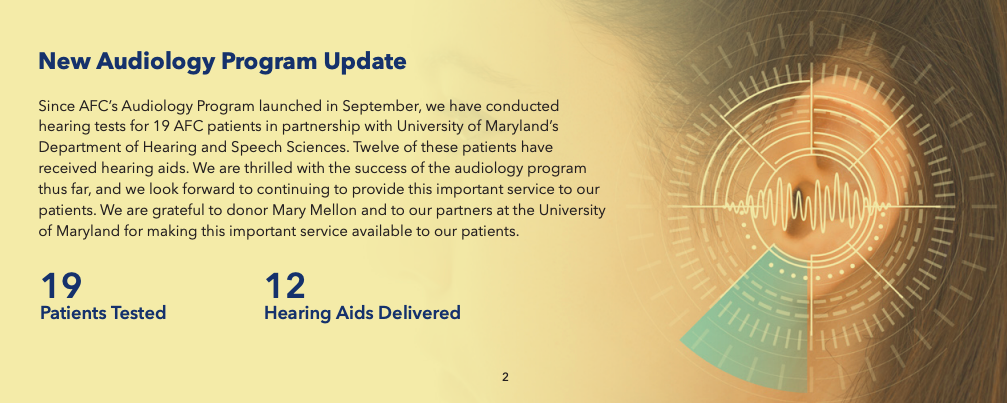As we emerge—hopefully—from the worst of the pandemic, we are finding that our patients need to address health conditions, new and old, as well as mental health challenges and dental issues. We have also found that—due to reduced volunteer capacity or patients’ other priorities— preventive health screenings have been deferred during the pandemic. AFC is committed to “catching patients up” on these important interventions.
This includes mammograms and pap smears; colonoscopies to screen for colon cancer; DEXA scans to evaluate for osteoporosis; and oral and mental health screenings. During the pandemic, our Women’s Health team maximized outreach by phone to our patients to schedule them for breast cancer screenings, so mammograms actually increased in 2021. However, cervical cancer screenings requiring office visits were curtailed, as we used available appointment slots for patients with immediate gynecological needs. To address the unmet need for HPV/ pap testing, AFC is working to recruit more GYN volunteers and identify new primary care providers to help with monthly pap-focused clinics.
For colorectal screenings, we are routinely referring to the National Institutes of Health but have also onboarded a new volunteer gastroenterologist— recently retired from Kaiser Permanente—who can perform potentially life-saving diagnostic procedures like colonoscopies and EGDs, especially for patients with symptoms.
As we resume routine screenings for depression and substance use, we are getting more behavioral health referrals. Thanks to recent grant awards for our behavioral health program, we are enhancing volunteer recruitment efforts for counselors, psychiatrists, and psychiatric nurse practitioners, as well as adding several paid staff positions to help us better meet the growing need.
AFC is also working to reinforce prevention and wellness through education and support for healthy lifestyles. We are building back our Move to Health exercise program with classes onsite and with Zoom access every Tuesday night. We are also recruiting dietitians and diabetes educator volunteers to resume one-on-one education sessions. In addition, our 6-week virtual sessions on general topics in mental health have been popular with patients.
To assess the success and effectiveness of our work, AFC is leveraging our electronic health record (EHR), Epic, to document, retrieve, and store patient medical information and report on healthcare services. AFC also uses our EHR to proactively manage patient care. We regularly generate lists of patients needing preventive (e.g., immunizations or mammography) and chronic disease management care (e.g., patients with diabetes needing lab tests). We carefully monitor these metrics over time and use them to inform ongoing operations and strategic planning efforts and to enhance care for individual patients.
